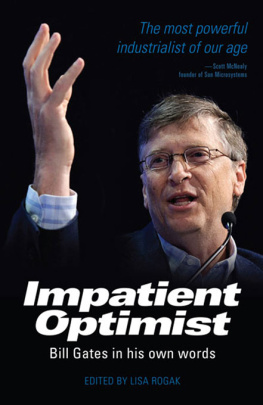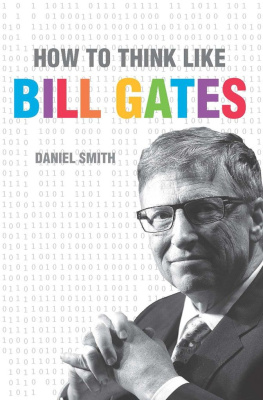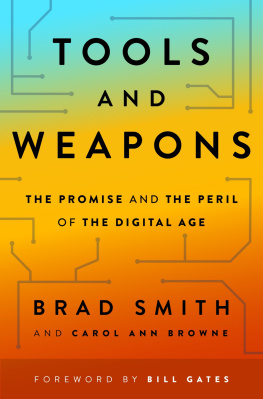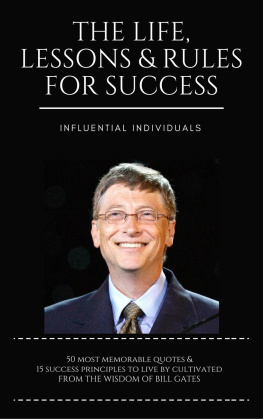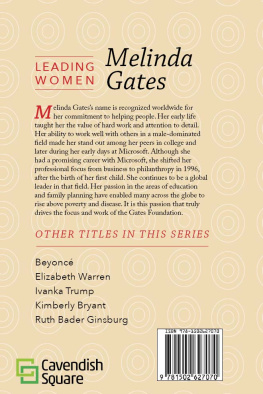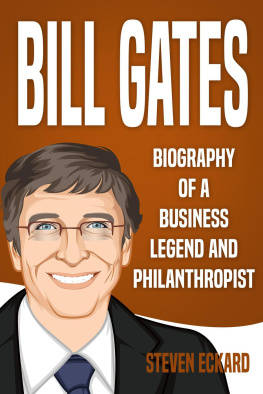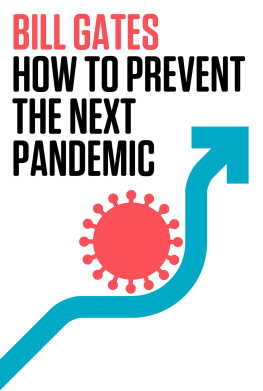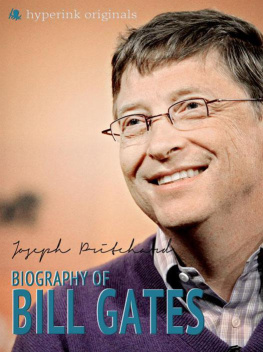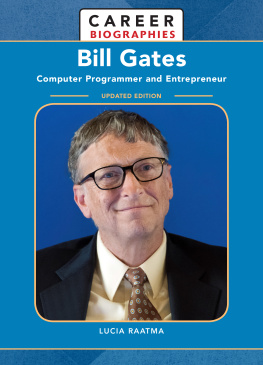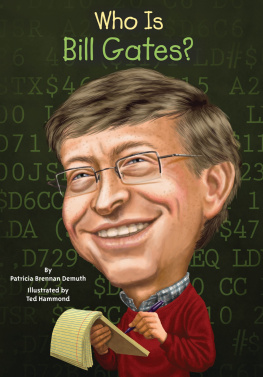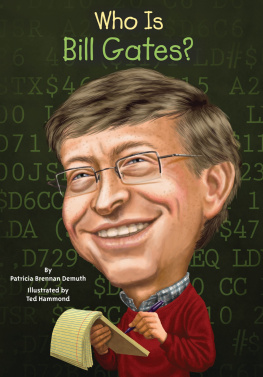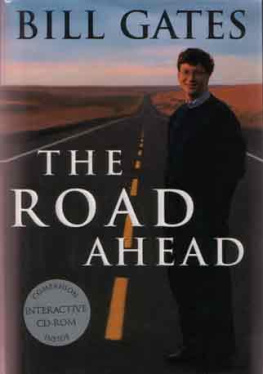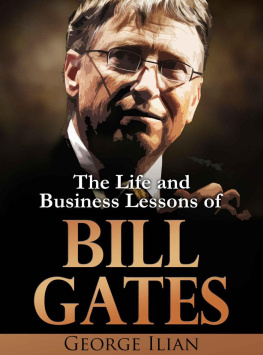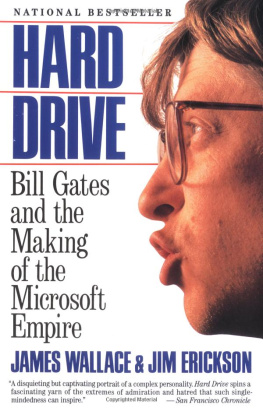

This is how I see the world, and it should make one thing clear: I am an optimist. But I am an impatient optimist.
Creative Capitalism, 2008
CONTENTS
Love him or hate him, Bill Gates has been a venerable worldwide business icon for more than three decades, ever since the first mass-produced personal computer debuted in 1981.
Alternately described as an ingenious visionary and a tyrannical, sometimes less-than-scrupulous businessman, its been all but impossible to ignore him. But despite their opinion of Gates, even his most prominent naysayers have no choice but to admit the obvious: he helped to spearhead one of the greatest revolutions in modern history by turning the inaccessible computer technology of the 1970s into an invaluable and easy-to-use tool for the masses, while also providing jobs and wealth to many along the way.
Gates has consistently been ranked as one of the worlds wealthiest men as well as one of the most controversial founders and CEOs in history and businesspeople of all stripes have taken their cues from him, using his words and business strategies to help create and grow their own companies. And in contrast to his hard-nosed reputation, after he left running the day-to-day operations of Microsoft in 2008 to devote himself full time to the Bill & Melinda Gates Foundation, a kinder, gentler side began to emerge. As a result, people who are actively involved in their own philanthropic efforts have begun to take a second look at the man.
Despite the fact that hes no longer at the helm of one of the worlds most powerful companies, Gates has steadfastly remained in the news. His friendship and philanthropic partnerships with U2s Bono and investing titan Warren Buffett attract the attention of both the media and the public, which only helps to gain more attention for his charitable acts, whether its testifying with former US president Bill Clinton about increasing federal aid to earthquake-ravaged cities and villages in Haiti, or making the rounds at the Sundance Film Festival to promote the topic of public education reform. And unlike Gates days at Microsoft, where he was entrusted with protecting a bevy of corporate secrets, today his life is virtually an open book, featuring regular updates on Facebook and Twitter and blog posts at TheGatesNotes.com.
Bill Gates second act is no less compelling than his first. Anyone interested in his personal life or looking for inspiration to drive forward their own business endeavours can find enlightenment through reading Gates own words.

ACQUIRING OTHER COMPANIES
Weve done a number of acquisitions in our history A lot of the time, the reason we do the acquisition is, when we see a market developing very rapidly we want to reduce the amount of time it takes us to get in there, get working with customers, get the feedback thats valuable.
Keynote speech, San Jose State, 27 January 1998.
ADDICTION TO TECHNOLOGY
If a kid is addicted to a personal computer, I think thats far better than watching TV, because at least his mind is making choices.
Programmers at Work, 1986.
AFRICAN-AMERICAN EDUCATIONAL DISPARITY
Its a great irony that Brown v. Board of Education is viewed as a milestone in civil rights, and yet the difference in the quality of what the average black student was getting in 1954 versus what the average student is getting today is not that great Some of the more outrageous [segregation laws were] easier to solve than this school thing.
Ebony, October 2011.
Why isnt there outrage, absolute outrage over this issue [of disparity in the education system]? Why arent there protests every day, I dont understand. Why wouldnt this activate people the way that it did during the Civil Rights Movement?
Ebony, October 2011.
AIR TRAVEL
[Flying economy] costs less money. You get there just as fast as flying first class. And my body fits. If I was really wide or really tall, I might view the issue differently.
New York Times News Service/Syndicate, 29 August 1995.
AMERICA
I was a huge beneficiary of this countrys unique willingness to take [a] risk on a young person.
CNBC Town Hall Event, Columbia University, 12 November 2009.
AMERICAN UNIVERSITIES
Our university system is the best. We fund our universities to do a lot of research and that is an amazing thing. We reward risk taking It is a chaotic system, but it is a great engine of innovation in the world, and with federal tax money [and] philanthropy on top of that, [it will continue to flourish].
The World is Flat, 2005.
ANALYSING OTHER COMPANIES
We focus on what companies do well as opposed to what they do poorly. We dont dismiss a company as unimportant just because a lot of things about it may be less than perfect. The company may be doing something important; it may not even know that it is important.
New York Times News Service/Syndicate, 19 February 1996.
(HIS) ANTISOCIAL TENDENCIES
I came to be the leader of the antisocial group [at Harvard]. We clung to each other as a way of validating our rejection of all those social people.
Commencement address, Harvard University, 7 June 2007.
ANDY GROVE
Andy Grove is an incredible CEO. Hes big on picking objectives, and driving the company towards that objective. Hes big on clarity. He is an engineering manager, par excellence.
Keynote speech, San Jose State, 27 January 1998.
ANTI-VACCINE PROPONENTS
Its an absolute lie that has killed thousands of kids. Because the mothers who heard that lie, many of them didnt have their kids take either pertussis or measles vaccine[s], and their children are dead today. And so the people who go and engage in those anti-vaccine efforts, they kill children. Its a very sad thing, because these vaccines are important.
CNN, 4 February 2011.
APPLE
To create a new standard, it takes something thats not just a little bit different; it takes something thats really new, and really captures peoples imagination. And the Macintosh of all the machines Ive seen is the only one that meets that standard.
Speech, 1984.
BAD NEWS
There is a tendency in companies to let good news travel fast. Oh, we just won this account. Oh, things went so well. But, the thing about good news is, its generally not actionable Bad news, on the other hand, is actionable. This customer is not very happy. This competitor is doing something very well. This project is behind The sooner you get the bad news, the better off youre going to be, in order to kind of absorb it, to change your product plan, to go back and talk to the people, really dig into it. So when somebody sends me mail saying, you know, we won XYZ account for Exchange, I send mail back and say, does that mean we lost every other account, because you only sent me mail on one account? Tell me about the ones we lost, and why? And so thats really gotten into our culture.
Keynote speech, San Jose State, 27 January 1998.
BEING CEO
Steve Ballmer said that the responsibility of being CEO was more burdensome than he had expected. Well, I told him before he took the job that it was an inhuman job. It makes infinite demands on you, and I feel very lucky that I have Steve. I think hes stepping into the shoes exactly the way I hoped he would.
Next page
